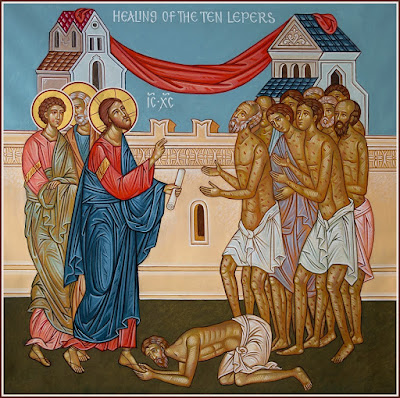All of Jesus’ miracles are remarkable, but one that stands out to me involves ten lepers that He encountered on a journey to Jerusalem.
Now it happened as He went to Jerusalem that He passed through the midst of Samaria and Galilee. Then as He entered a certain village, there met Him ten men who were lepers, who stood afar off. And they lifted up their voices and said, “Jesus, Master, have mercy on us!” So when He saw them, He said to them, “Go, show yourselves to the priests.” And so it was that as they went, they were cleansed. And one of them, when he saw that he was healed, returned, and with a loud voice glorified God, and fell down on his face at His feet, giving Him thanks. And he was a Samaritan. (Luke 17:11–16)Why does this particular miracle stand out so prominently? Because the healing was topsy-turvy and backwards. Jesus came into an unnamed village when this small band of men living near, but outside (see Lev 13:45–46), the city asked for mercy from their affliction—an expected reception from those with incurable infirmities who had heard of the Miracle Worker. Jesus’ response is another matter.
Go, Show Yourselves
Moses had received specific instructions on Mt. Sinai for the cleansing of one no longer afflicted with a leprous disease. In summary, the process from Leviticus 14:1–32 was:
- Priest meets a formerly leprous person outside the camp for examination.
- Kill one bird in an earthen vessel to capture its blood.
- Dip the live bird, cedar wood, scarlet, and hyssop in the blood; sprinkle the person to be cleansed; release the bird.
- Person shaves his head, washes clothes, and bathes.
- Person lives outside his tent seven days, after which he shaves all hair, washes clothes, and bathes again.
- On the eighth day, the priest makes the atoning sacrifice based on what the person can afford and anoints the person similarly to the priest.
He Was a Samaritan
Jesus told the Samaritan leper to go to the priest as a witness. While there were no specific Levitical laws which forbade an outsider from going through the cleansing ritual, there were some preventing foreigners from being part of the worshiping community. In view of this restriction, Jesus’ command to the men becomes more stark. While the Lord’s favor might have been expected toward the Jews, none was toward outsiders, especially the despised Samaritans. This man would become a witness to the priests that divine favor was not reserved for the Jews, but would be extended to all who believed in the Father and the One whom He sent. The Samaritan not only had a physical healing but a complete one through faith.
So Jesus answered and said, “Were there not ten cleansed? But where are the nine? Were there not any found who returned to give glory to God except this foreigner?” And He said to him, “Arise, go your way. Your faith has made you well.” (Luke 17:11–19)Jesus told a different Samaritan that something new was in the offing. While journeying from Judea to Galilee, Jesus took His disciples through Samaria rather than going around the region as most Jewish travelers would do. His encounter with a Samaritan woman of ill repute (John 4:1–26) made clear that worship before God would no longer be dictated by location and ancestral lines but in spirit and truth through faith (John 4:21–24).
The Way Made Open
One does not need to dwell long on these accounts to understand their poignancy and application. Here were two individuals—separated from God by both blood and uncleanness—made clean and whole through Jesus’ word and promise. These serve as a precursor for our own entry into the family of faith. We who had no place as unclean outsiders are made presented clean and holy through faith by virtue of the great transaction on the cross at Golgotha. There a new and living way was made open, so that all who are baptized into Christ and believe on Him are now full beneficiaries of God’s abundant grace. What a blessing! May we also with a loud voice glorify God and worship Him who made us clean and whole.
